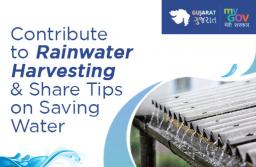The most precious gift of nature to humanity is water. Since life on earth cannot exist without it, water can also be referred to as life. We need water for all our daily activities.
The available water resources should be used judiciously, so that we do not face water crisis in future. For this, it is necessary that everyone uses water mindfully, conserves water as well as spreads awareness about water conservation measures.
By saving more and more rainwater and taking various measures to save water, we can contribute in maintaining the ground water level and maintaining the availability of water continuously.
If you have adopted any innovative and unique ways of saving water, with which we can conserve more water, share it with your thoughts in the comment box below.
Last date of submission is 6th August,2022.












BrahmDevYadav 3 years 4 महीने पहले
How do you collect and store rain water?
This is the simplest and most affordable way to harvest rainwater. We may simply place barrels or water tanks below the downspouts of your gutter system. This tank can be connected to a pipe for drip irrigation.
Dry System:- A dry system uses a larger storage container for the water.
BrahmDevYadav 3 years 4 महीने पहले
How can we reuse rainwater?
Harvested rainwater can be safely used for non-potable activities, such as yard and landscape irrigation, watering potted plants and washing vehicles. Collected rainwater should NOT be used for drinking or other potable purposes, if it is not filtered and disinfected before use.
BrahmDevYadav 3 years 4 महीने पहले
What will happen if there is no rain?
If it suddenly happens to come that it stops raining, there would be ominous casualties. Many water bodies would dry up, land would wither and most importantly there will be no life left on earth. Plants and animals would all die.
BrahmDevYadav 3 years 4 महीने पहले
Does rain stop smoke?
Researchers have found similar effects for rain showing rains limited effect on reducing air pollution and smoke. Keep in mind that the effect of rain might be some what different in different cities. That is because some cities will have a higher percentage of large particles or small particles.
BrahmDevYadav 3 years 4 महीने पहले
Is rain water good for plants?
Plants grow greener with Rainwater. Nitrate, which is naturally present in the rainwater, is a great source of Nitrogen for plants. Nitrogen is among the top nutrient elements that are required for plant growth. Thus, plants grow greener when they are watered with rainwater.
BrahmDevYadav 3 years 4 महीने पहले
Is rain water hard or soft?
Hard water is the name given to water which contains magnesium and calcium minerals. Hard water becomes such when rainwater, which is naturally soft, falls on porous ground, such as limestone or chalk.
BrahmDevYadav 3 years 4 महीने पहले
Is rain water dirty?
Rainwater can carry bacteria, parasites, viruses and chemicals that could make you sick and it has been linked to disease outbreaks. The risk of getting sick from rainwater may be different depending on your location, how frequently it rains, the season and how you collect and store the rainwater.
BrahmDevYadav 3 years 4 महीने पहले
How rainwater harvesting can solve our country's water shortage?
Rain-water harvesting can save gallons of water for daily household or office use. For every 1000 sq feet of roof space, approximately 620 gallons of water can be saved every time it rains. This source of non-potable water can be used in flushing toilets, laundry etc.
BrahmDevYadav 3 years 4 महीने पहले
Why is rainwater harvesting urgently needed in India?
It is more affordable, less time-consuming, and easier to implement than the complicated systems that are required for wastewater treatment. Rainwater harvesting also helps in reducing India's dependence on groundwater and private sources like tankers.
BrahmDevYadav 3 years 4 महीने पहले
Does rain clean the air?
As a raindrop falls through the atmosphere, it can attract tens to hundreds of tiny aerosol particles to its surface before hitting the ground. The process by which droplets and aerosols attract is coagulation, a natural phenomenon that can act to clear the air of pollutants like soot, sulfates and organic particles.